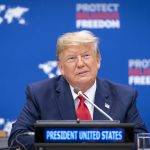Dr. Sebastian Gorka, once the Senior Director of Counterterrorism for the National Security Council (NSC) under President Trump, recently shed some light on how the Trump administration fundamentally shifted the United States’ approach toward the extermination of jihadist terrorists during a detailed interview. Gorka argued that under Trump’s leadership, the U.S. underwent a seismic policy shift in the realm of counterterrorism, especially when compared to the previous administration, which Gorka equated to coddling the bad actors.
According to Gorka, when Trump took office, he discovered that the intelligence community had been meticulously tracking jihadists for hours on end but had been hamstrung by bureaucratic red tape. For nearly eight years, anyone wanting to take out a high-value target had to navigate the convoluted approval processes culminating in the White House, practically putting these operations in limbo. Under Trump and National Security Adviser Mike Waltz— a former Green Beret—this was flipped on its head. Gorka recounted a particularly revealing episode where they presented a specific target in Somalia to Trump. The President didn’t mince words; he told them to eliminate the threat without hesitation.
Gorka emphasized that such rapid decision-making and decisive action was the hallmark of Trump’s presidency. The speed with which operations were conducted, such as taking down an ISIS recruiter in just 30 hours after Trump’s green light, was a far cry from the paralysis seen previously. In stark contrast to the past, where avoiding action appeared to be the norm, Trump reestablished an effective counterterrorism doctrine that put American interests back at the forefront. Gorka assured listeners that this decisive approach not only signaled a turning point in how challenges from terrorism were met but also reverberated through the ranks of American military and intelligence.
Now we’re finally killing the Jihadis who have America blood on their hands.
Thanks to President @realDonaldTrump. https://t.co/nBQZw32mXb @WhiteHouse @mboyle1 @BreitbartNews
— Sebastian Gorka DrG (@SebGorka) April 7, 2025
Throughout the interview, Gorka highlighted four major actions taken by Trump during his early days in office: striking against the ISIS recruiter in Somalia, capturing the mastermind of the Abbey Gate bombing during the disastrous U.S. withdrawal from Afghanistan, eliminating another Islamic leader in Iraq, and combatting the Houthi rebels in Yemen who had meddled with vital maritime trade routes. According to Gorka, these actions illustrated Trump’s commitment to counterterrorism, returning power to military operators who could act swiftly, rather than mired in endless bureaucratic approval processes.
With the Trump administration back in action, Gorka also pointed out the pressing need for American allies to step up and contribute more significantly. The self-proclaimed “CT partners” are not to be confused with NATO allies; rather, they represent a new category of allies expected to engage actively in the fight against terrorism. Gorka criticized the mainstream media for misconstruing Trump’s “America First” philosophy; far from advocating isolationism, Trump’s approach meant expecting more from allies, not less.
The overzealous attempts to stabilize terror hotbeds in regions like Africa and the Middle East highlighted the various threats still lingering, partly because of Biden’s prior administration allowing terrorist activities to re-emerge. Gorka asserted that the environment had deteriorated under Biden, leading to a revival of groups like ISIS and Al-Qaeda while U.S. forces had their hands tied. The call for robust military action against groups like the Houthis and maintaining freedom of navigation on critical trade routes emerged as priorities in Trump’s bold new strategy. Clearly, the narrative painted by Gorka is one of proactive leadership versus reactive efforts dictated by desk-bound bureaucrats.




